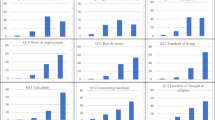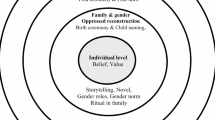Abstract
To assess the general attitude toward women’s participation in research studies in Jordan and determine the various cultural and religious issues that could impact the rate of inclusion of Arab and Muslim women in research studies, a descriptive cross-sectional questionnaire-based survey study was conducted among Jordanian university students using a 17-item opinion questionnaire. A total of 1265 students from different professional disciplines completed the questionnaire. The majority of the respondents (69.1%) believed that females in Jordan do not have full autonomy regarding their decision to participate in research studies. Study findings also showed that females are more likely to avoid participation in research studies that require staying outside the home or involve direct interaction between a researcher and study participants. Females would prefer to deal with female research assistants when participating in research studies. More effort is required to encourage and enhance the rate of participation in research studies among women in Jordan and, probably, other Middle Eastern societies. When designing and conducting research studies in these countries, researchers should seriously consider the cultural and religious beliefs.
Similar content being viewed by others
References
ACOG. (2015). Ethical considerations for including women as research participants. Committee Opinion No. 646. American College of Obstetricians and Gynecologists (ACOG). Obstetrics and Gynecology,2015(126), e100–e107.
Aroian, K. J., Katz, A., & Kulwicki, A. (2006). Recruiting and retaining Arab Muslim mothers and children for research. Journal of Nursing Scholarship,38(3), 255–261.
Beauchamp, T. L., & Childress, J. F. (2016). Principles of biomedical ethics. Oxford: Oxford University Press.
Bird, C. E., & Rieker, P. P. (1999). Gender matters: An integrated model for understanding men’s and women’s health. Social Science and Medicine,48(6), 745–755.
Blehar, M. C., Clayton, J. A., Spong, C., Grady, C., Goldkind, S. F., & Sahin, L. (2013). Enrolling pregnant women: Issues in clinical research. Women’s Health Issues,23(1), e39–e45.
Daunt, D. J. (2003). Ethnicity and recruitment rates in clinical research studies. Applied Nursing Research,16(3), 189–195.
El Feki, S., Heilman, B., & Barker, G. (2017). Understanding masculinities: Results from the International Men and Gender Equality Survey (IMAGES)—Middle East and North Africa. Cairo: UN Women and Promundo-US.
Electronic Code of Federal Regulations. (2018). Title 45 public welfare. Government publishing Office, USA, July-19-2018. Accessed May 10, 2019, from https://www.ecfr.gov/cgi-bin/text-idx?gp=&SID=83cd09e1c0f5c6937cd9d7513160fc3f&pitd=20180719&tpl=/ecfrbrowse/Title45/45tab_02.tpl.
Islam, S. M. S., & Johnson, C. A. (2003). Correlates of smoking behavior among Muslim Arab-American adolescents. Ethnicity and Health,8(4), 319–337.
Killawi, A., Thurston, M., Fetters, M. D., Khidir, A., Elnashar, M., Abdelrahim, H., et al. (2014). Procedures of recruiting, obtaining informed consent, and compensating research participants in Qatar: Findings from a qualitative investigation. BMC Medical Ethics,15(1), 9.
Kwiatkowski, K., Coe, K., Bailar, J. C., & Swanson, G. M. (2013). Inclusion of minorities and women in cancer clinical trials, a decade later: Have we improved? Cancer,119(16), 2956–2963.
Martin, A., Negron, R., Balbierz, A., Bickell, N., & Howell, E. A. (2013). Recruitment of black and Latina women to a randomized controlled trial. Journal of Health Care for the Poor and Underserved,24(3), 1102–1114.
Mastroianni, A. C., Faden, R. R., Federman, D. D., & Institute of Medicine (US) Committee on Ethical and Legal Issues Relating to the Inclusion of Women in Clinical Studies. (1994). NIH Revitalization Act of 1993 Public Law 103-43. Women and health research: Ethical and legal issues of including women in clinical studies (Vol. I). Washington, DC: National Academy Press.
National Institutes of Health. (2015). Consideration of sex as a biological variable in NIH-funded research. Notice Number: NOT-OD-15-102. Accessed May 17, 2019, from https://grants.nih.gov/grants/guide/notice-files/not-od-15-102.html.
Panel on Research Ethics. (2014). Fairness and equity in research participation, Chapter 4. Canadian Institutes of Health Research, Natural Sciences and Engineering Research Council of Canada, and Social Sciences and Humanities Research Council of Canada, Tri-Council Policy Statement: Ethical Conduct for Research Involving Humans.
Phelan, A. L., Kunselman, A. R., Chuang, C. H., Raja-Khan, N. T., & Legro, R. S. (2016). Exclusion of women of childbearing potential in clinical trials of type 2 diabetes medications: A review of protocol-based barriers to enrollment. Diabetes Care,39(6), 1004–1009.
Purnell, L. D. (2013). Transcultural health care: A culturally competent approach. Philadelphia: F.A. Davis.
Rubin, R. (2018). Addressing barriers to inclusion of pregnant women in clinical trials. JAMA,320(8), 742–744.
Schweinhart, A., & Clayton, J. A. (2018). Reversing the trends toward shorter lives and poorer health for US women: A call for innovative interdisciplinary research. International Journal of Environmental Research and Public Health,15(9), 1796.
Stevens, P. E., & Pletsch, P. K. (2002). Informed consent and the history of inclusion of women in clinical research. Health Care for Women International,23(8), 809–819.
van der Graaf, R., van der Zande, I. S. E., den Ruijter, H. M., Oudijk, M. A., van Delden, J. J. M., Oude Rengerink, K., et al. (2018). Fair inclusion of pregnant women in clinical trials: An integrated scientific and ethical approach. Trials,19(1), 78.
Vitale, C., Fini, M., Spoletini, I., Lainscak, M., Seferovic, P., & Rosano, G. M. (2017). Under-representation of elderly and women in clinical trials. International Journal of Cardiology,232, 216–221.
Wang, H., Schumacher, A. E., Levitz, C. E., Mokdad, A. H., & Murray, C. J. (2013). Left behind: Widening disparities for males and females in US county life expectancy, 1985–2010. Population Health Metrics,11(1), 8.
Acknowledgements
The authors thank Dr. Omar Khabour, Professor in the Department of Medical Laboratory Sciences at Jordan University of Science and Technology, for his contribution to the editing and review of this manuscript.
Funding
This research project was supported by Grant #5R25TW010026-02 from the Fogarty International Center of the US National Institutes of Health on behalf of the Research Ethics Program in Jordan.
Author information
Authors and Affiliations
Corresponding author
Ethics declarations
Conflict of interest
The authors declare that they have no conflict of interest.
Additional information
Publisher's Note
Springer Nature remains neutral with regard to jurisdictional claims in published maps and institutional affiliations.
Rights and permissions
About this article
Cite this article
Al Subeh, Z.Y., Alzoubi, K.H. Cultural and Religious Barriers Influencing the Participation of Women in Research: A Study from Jordan. Gend. Issues 37, 173–186 (2020). https://doi.org/10.1007/s12147-019-09235-1
Published:
Issue Date:
DOI: https://doi.org/10.1007/s12147-019-09235-1




